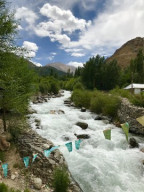
“Armed groups including the Taliban, al Qaeda, and their affiliates should cease attacks that target children, educational personnel, and schools,” the statement said.
According to the statement, HRW has collected reports of 96 school attacks in Pakistan this year alone. Most of these attacks took place in Khyber-Pakhtunkhwa province (KP) and the Federally Administered Tribal Areas (FATA) bordering Afghanistan.
Fourteen attacks were reported from Mohmand Agency in the tribal areas. Dozens of attacks were reported from various districts of KP.
Thirteen schools were attacked in Swabi district, 12 in Charsadda district, and 11 in Mardan district. Schools have also been attacked in Balochistan and Sindh provinces.
The United Nations reported 152 incidents of partial or complete destruction of school facilities in FATA and KP in 2011.
“Parts of Pakistan are among the most dangerous places in the world to go to school today,” said Ali Dayan Hasan, Pakistan director at Human Rights Watch.
“It’s time Pakistani authorities understand that expressions of outrage alone are inadequate and such attacks will only end if they hold abusers accountable.”
“The unity of global condemnation and the speed of response in the wake of Malala’s shooting were phenomenal, but we need to see the same kind of reaction every time a student or school is attacked,” Hasan said.
“The schools that have remained for years as piles of rubble across Pakistan’s north-west bring into question the government’s level of commitment to seeing children return to school in safety.”
Human Rights Watch said that non-governmental organization workers in FATA and KP have been targeted, including for their work on education.
- In July, Farida Afridi, a women’s rights activist was murdered apparently for her work on girls’ education and women’s empowerment in Khyber Agency, FATA.
- In May, a local politician issued an edict [fatwa] decrying girls’ education as un-Islamic, arguing that education persuaded girls to join nongovernmental organizations, and threatened to have women nongovernmental organization workers in Kohistan, KP, forcibly married.
- In December 2011, militants gunned down and killed Zarteef Afridi, a decades-long teacher who started a school and was committed to promoting children’s and women’s rights in Khyber Agency, while he was on his way to school.
The statement said that the federal government should cooperate with provincial authorities to create an advance rapid response system whenever there are attacks on schools, so that these facilities are quickly repaired or rebuilt and destroyed educational material is replaced so that children can return to school as soon as possible.
During reconstruction, students should be provided education through alternative means and, where appropriate, given psychosocial support, the statement said.
The Pakistan army should also refrain from turning schools into targets by using them as bases, said Human Rights Watch. A 2009 documentary about Malala Yousafzai indicates, for example, that her school had been used as a military base by the army.
“This is more than just the case of the shooting of one brave girl, but a crisis for the entire Pakistani education system,” Hasan said. “It is time Pakistani authorities understood that those who seek to harm students and teachers wish to rob Pakistan of its future.”
COMMENTS (3)
Comments are moderated and generally will be posted if they are on-topic and not abusive.
For more information, please see our Comments FAQ

















Muslims trapped in ghetto of fear in Myanmar city.... perhaps HRW can try their hand in Burma as well
@Zahid - I completely disagree. Human Rights Watch is a NON-Governmental organization which means they have nothing to do with the government. They do not receive funds from the US government and even report on Human Rights violations in the US. Please check your facts before you make these ridiculous accusations about "these foreign forces" you should be happy someone is standing up for the people of Pakistan.
These foreign forces trying to order us what to do and what not to do...
We refuse to listen to them.